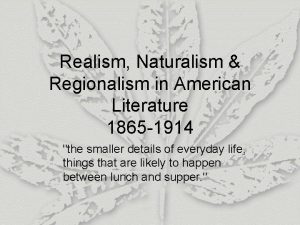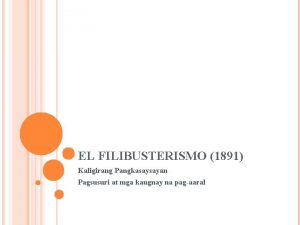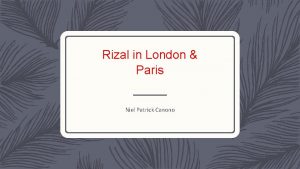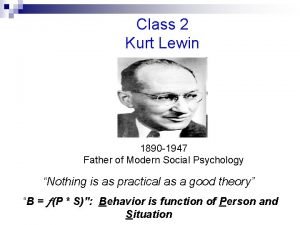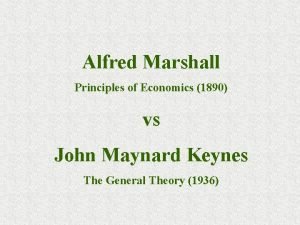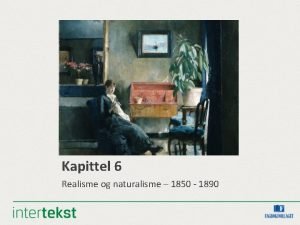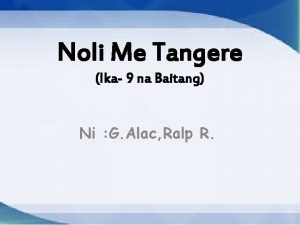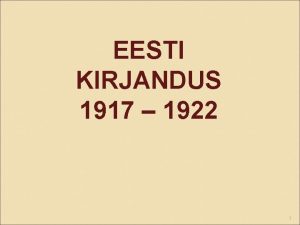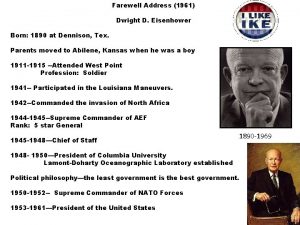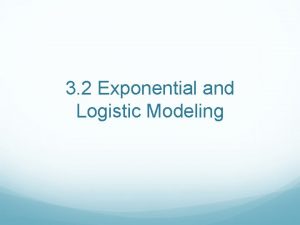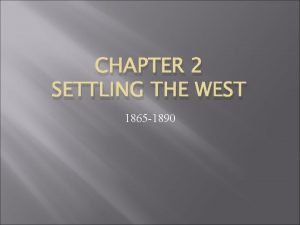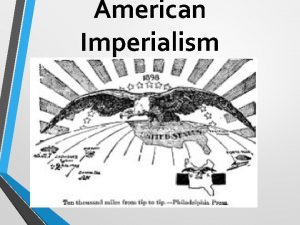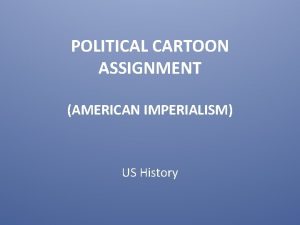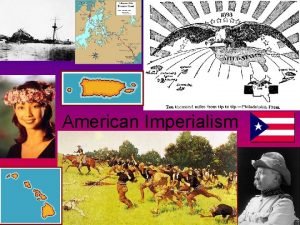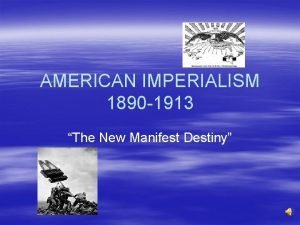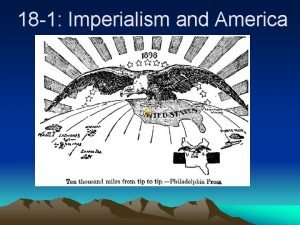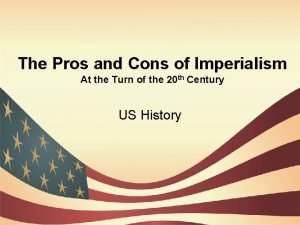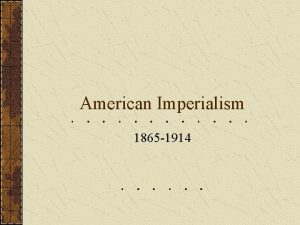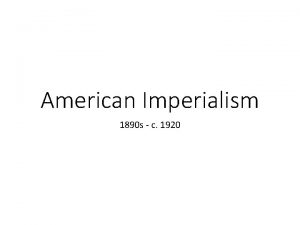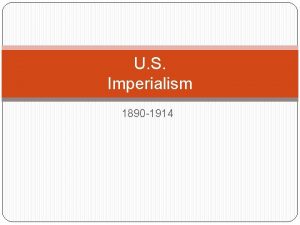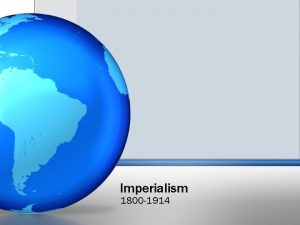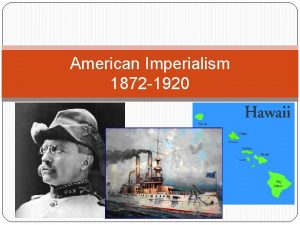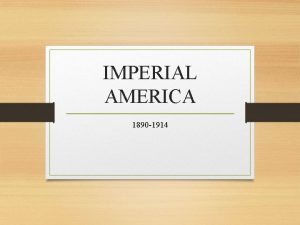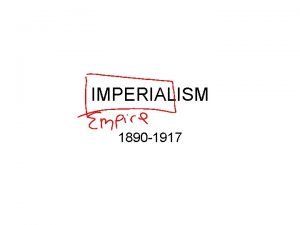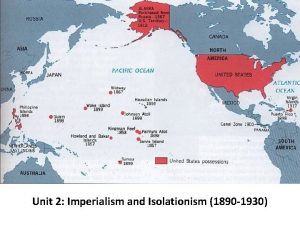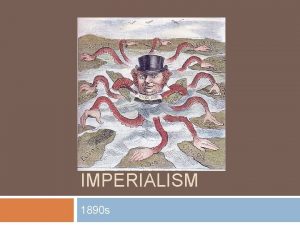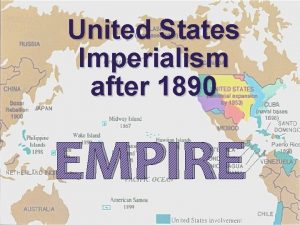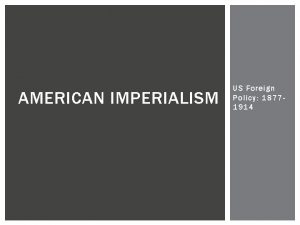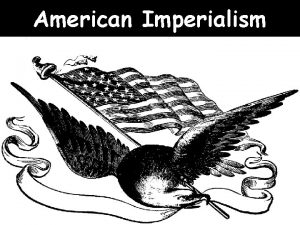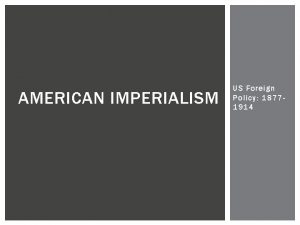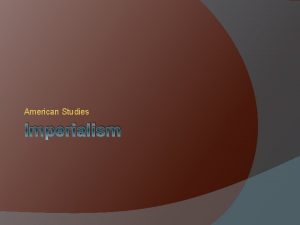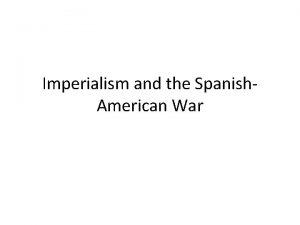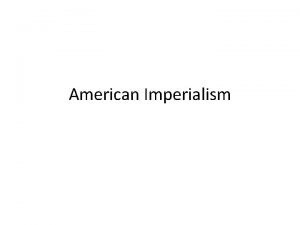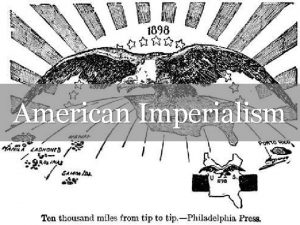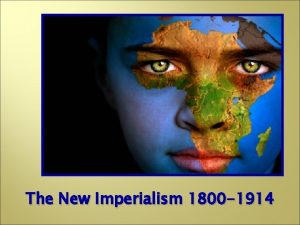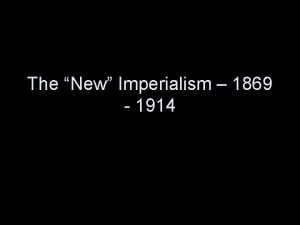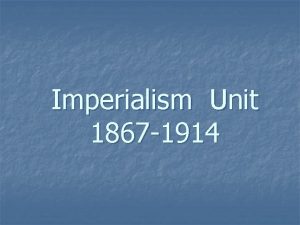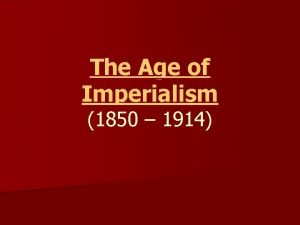American Imperialism 1890 1914 American Imperialism Prior to

























- Slides: 25

American Imperialism 1890 -1914

American Imperialism • Prior to the Civil War the United States was more interested in the development of industry, settlement of the West, and a general sense of isolationism • After the war many people, especially with business interest, turned to acquiring new territory for resources and markets • Foreign involvement necessitated a strong navy to protect American investment • European nations had already started the imperial expansion

Alfred T. Mahan • In 1890 Captain Mahan published a book, The Influence of Sea Power upon History 1660 -1783 • He argued that national greatness came from maritime strength • His ideas became very popular in America, Roosevelt ordered a copy for every ship • By the end of the century the United States would be developing one of the strongest navies in the world • Another notion to justify imperial success was that of Social Darwinism

The Pacific • The United States benefited from the fact it had two major oceans on either side to separate it from potential enemies • In 1867 President Johnson’s secretary of state William Seward purchased Alaska from the Russians for $7. 2 million • In 1878 the Samoans granted the United States the rights to the naval base at Pago • The next territory was Hawaii

Hawaii • Hawaii had American planters and missionaries and was strategically more significant than Samoa • In 1875 the Hawaiians entered into an agreement with America in which sugar would be shipped to America duty free and the Hawaiians promised not to lease any land to a third-party • In 1887 Americans forced the king to accept a new Hawaiian constitution and a constitutional government dominated by Americans • The Mc. Kinley Tariff (1890) hurt the Hawaiians by removing the duty-free status from sugar

• In 1891 Liliukalani ascended to the throne and tried to regain power from the Americans • The whites on the islands revolted and in 1893 they seized power • Americans marines were sent to the islands to support the coup • A new government was formed in Washington and so did a treaty of annexation • Democratic senators blocked ratification • President Cleveland sent a special team to the islands to investigate the events • They found that the coup had been organized by American planters

• Cleveland suggested returning power to the queen • The new government refused to give up power and declared the islands the Republic of Hawaii with a constitution which allowed for annexation by America • In 1897 Mc. Kinley sent American warships to the island to prevent Japanese interest and asked the Senate to approve annexation • The Senate failed to get the necessary votes so Mc. Kinley used a joint resolution of the House and Senate • Hawaii was annexed in 1898

Spanish-American War • Cuba had revolted against Spanish control for most of the nineteenth century • In 1895 an revolt broke out and in the process sugar production collapsed • America supported the rebels and their hit-andrun tactics • In 1896 the Spanish general Valeriano Weyler started to detain suspects in detention centers • Conditions in the centers were terrible and many died – Americans called Weyler, the “butcher”

• William Randolph Hearst’s New York Journal and Joseph Pulitzer’s New York World battled each other to produce sensational journalism – “yellow journalism” - to attract readers • Most Americans were sympathetic towards the rebels, but President Cleveland refused to interfere • Mc. Kinley had no reservations • In 1898 the American battleship Maine docked at Havana • On February 15, 1898 the Maine exploded with the loss of 266 men • Secretary of the navy Theodore Roosevelt blamed the explosion on the Spanish

Teller Amendment • Mc. Kinley tried to maintain the peace but the public outcry, “Remember the Maine” was too loud • Spain ordered a cease-fire, but Mc. Kinley asked Congress force to protect American interests • Congress issued a joint resolution which endorsed the use of force and declared Cuba independent. • The Teller Amendment claimed that the United States had no design on taking Cuba • America blockaded Cuba – which was an act of war forcing Spain to declare war on April 24

• Congress then declared war on Spain and made it retroactive to April 21, 1898 • The war lasted 114 days and was called by John Hay “a splendid little war” – it was the start of America becoming a global power • Roosevelt had Commodore George Dewey attack Manila Bay in the Philippines • The attack was a resounding victory and destroyed the Spanish fleet • When reinforcements arrived, with the help of Emilio Aguinaldo, American troops entered Manila – with the British and Germans watching for the chance to intervene and gain the islands

Rough Riders • 17, 000 troops prepared to invade Cuba – one unit was known as the “Rough Riders” • Roosevelt was second in command, having quit the Navy Department to get “in on the fun” • Rough Riders and other units quickly won a series of battles including San Juan Hill and then laid siege to Santiago • Santiago surrendered and then the Americans took Puerto Rico • Spain sued for peace • In four months nearly 6, 000 Americans died, but only 379 in battle – the rest from disease

Treaty of Paris (1898) • The Treaty of Paris was signed in 1898: a) Americans offered Spain $20 million in compensation for the Philippines b) America gained Puerto Rico and Guam • Democrats and Populists opposed ratification in the Senate – arguing for isolationism and maintenance of the Monroe Doctrine • William Jennings Bryan influenced approval by saying both Cuba and the Philippines could be independent • Eventually a vote to make the Philippines independent was defeated by one vote

Platt Amendment • The United States pulled out of Cuba in 1902 • However Washington was not willing to leave the strategically important island alone • The Cubans were forced to write their own Constitution • The Platt Amendment to the Army Appropriations Bill was passed by Congress in 1901, severely limited the Cubans • The Cubans could not sign a treaty with a thirdparty and acknowledged the right of the United States to intervene, and to lease a naval station at Guantanamo Bay

China • Japan defeated China in the Sino-Japanese War (1894 -95) • Other countries looked at China as a possible possession • The British suggested that the United States join an agreement to guarantee the integrity of China – the Senate refused any alliance • In 1899 Secretary of States John Hay suggested an “Open Door Policy” • China would be open to trade with all countries on an equal basis

Boxer Rebellion (1900) • In 1900 Chinese nationalists known as Boxers rebelled against foreign influence • They placed foreign embassies under siege • An international force, including American troops, suppressed the rebels • China was forced to pay an indemnity of $333 million ($25 million to America)

The Election of 1900 • The Republicans renominated Mc. Kinley with the young and aggressive Theodore Roosevelt as his running mate • The Democrats nominated William Jennings Bryan who attacked the new imperialism of the Republicans • Mc. Kinley won the popular vote and the electoral count (292 -155) • In 1901 Mc. Kinley was assassinated by a anarchist, Leon Czolgosz, at the Pan American Exposition in Buffalo • At 42 Roosevelt became the youngest President

Theodore Roosevelt • Teddy Roosevelt had grown up in a wealthy family in New York. He had attended Harvard and graduated Phi Beta Kappa • As a small child he was often sick, but gradually through physical exercise he built himself up • In 1897 he had been appointed assistant secretary of the navy by Mc. Kinley • He quit the position to join the Rough Riders and gained fame in the Cuba • Following Cuba he was easily elected governor of New York

Big Stick Diplomacy • Roosevelt’s policies were summed up in the phrase, “Speak softly, and carry a big stick” • He saw every problem as an issue of patriotism and morality • One of his first big foreign endeavors was the Panama Canal • After the Spanish-American War it became obvious to Roosevelt as a matter of national security that there needed to be a route to connect the oceans

Panama Canal • In the Clayton-Bulwer Treaty (1850) the British promised not to take any more Central American possessions and they agreed to build a canal with the Americans • After the Spanish-American War the Americans were eager for the construction to start • In the Hays-Paunceforte Treaty (1900) both countries agreed to start negotiations prior to work – but the Senate rejected the treaty because it promised the canal would always remain neutral

• In 1901 the British, stuck in the Boer War, conceded control of the canal to the Americans • The Hays-Paunceforte Treaty now read the United States would build the canal – and was passed • The big question - where should the canal be dug? • Many favored Nicaragua, others looked at Panama • The French had already tried and failed (lack of technology) to build a Panama Canal • The French canal Company led by Philippe Bunau-Varilla, eager to make money sold the company to the United States for $40 million

• In 1902 Congress agreed on a Panama Canal • The new problem was what to do with Colombia? – Panama was part of Colombia • The United States and Colombia negotiated a deal that would lease a six-mile strip of land in perpetuity for $10 million and $250, 000 a year • The Colombians rejected the deal and demanded more money • Roosevelt was furious • Bunau-Varilla worked in Panama to create a revolution against the Colombians • When the Colombian troops tried to suppress the revolution they were stopped by American warships

• The first ambassador from Panama was Bunau. Varilla and he signed the treaty for the canal – The canal zone would be 10 -miles wide and would cost $10 million plus $250, 000 a year • In 1904 Congress created the Isthmian Canal Commission to oversee construction • Roosevelt told the Commission to make the “dirt fly” • The canal opened in 1914, two weeks after the start of World War One

Roosevelt Corollary • In the early 1900 s the United States was worried about the possible interference by European nations into the affairs of Caribbean nations • Venezuela and the Dominican republic were deeply in debt to European nations • In his annual address in 1904 Roosevelt issued his Corollary to the Monroe Doctrine • He stated that problems, especially financial problems in the Western Hemisphere may require the United States to use police powers to correct those problems

• In 1905 the United States intervened for the Dominican Republic • Politicians on the island did not approve of the tactics, but with some persuasion from Washington the matter was resolved • The message was clear for all European countries – you will not be allowed to interfere in the affairs of Latin America • Many saw Roosevelt’s tactics as the height of a “Bad Neighbor” policy, but he did manage to turn the Caribbean into a “Yankee lake”
 Imperialism map 1914
Imperialism map 1914 American literature 1865 to 1914
American literature 1865 to 1914 New imperialism motives
New imperialism motives Old imperialism vs new imperialism
Old imperialism vs new imperialism Aug 1891 el filibusterismo
Aug 1891 el filibusterismo The population of smallville in the year 1890 was 6250
The population of smallville in the year 1890 was 6250 Mayo 25 1888 el filibusterismo
Mayo 25 1888 el filibusterismo Kurt lewin (1890-1947)
Kurt lewin (1890-1947) Keynes marshall
Keynes marshall Naturalismen drama
Naturalismen drama Peck at buckingham kahulugan
Peck at buckingham kahulugan Layunin ni jose rizal sa noli me tangere
Layunin ni jose rizal sa noli me tangere 1890'lı yıllarda ingiltere'de whiff
1890'lı yıllarda ingiltere'de whiff 1890 computer
1890 computer Poeet 1890-1952
Poeet 1890-1952 Born 1890
Born 1890 The population of smallville in the year 1890 was 6250
The population of smallville in the year 1890 was 6250 Settling the west 1865 to 1890
Settling the west 1865 to 1890 Riconoscimento degli oggetti
Riconoscimento degli oggetti American imperialism 1800s
American imperialism 1800s Roots of american imperialism
Roots of american imperialism Cartoon
Cartoon Russia wants alska
Russia wants alska American imperialism definition
American imperialism definition The roots of american imperialism 1. economic roots
The roots of american imperialism 1. economic roots American imperialism pros and cons
American imperialism pros and cons

